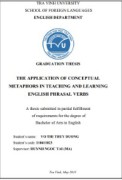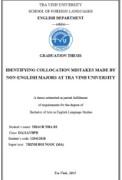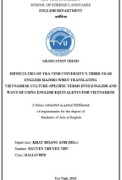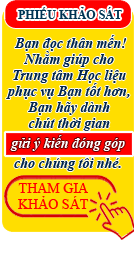


|
Tác giả: Võ Thị Thùy Dương, ThS. Huỳnh Ngọc Tài (người hướng dẫn) . |
|
Trường Đại học Trà Vinh. Năm: 2015. |
|
Mô tả: 57Tr, kích thước: 30cm. Số định danh: |
|
Tóm tắt: Much has been written about Vietnamese learners’ difficulties in learning and using English vocabulary. Little research has explored the effect of implementing conceptual metaphors on teaching English phrasal verbs to Vietnamese learners of English. Using a quasi-experimental study, I make an attempt to examine the influence of applying conceptual metaphors on teaching and learning phrasal verbs to Vietnamese first year undergraduate students of English major (n = 30) at Tra Vinh University (TVU). Participants are divided into two groups. On the one hand, participants in the control group were taught a set of 20 phrasal verbs whose particles including into, up, down, out, off phrasal verbs through the traditional instructions. On the other hand, students in the experimental group were received the same input through a cognitive linguistic approach. The study employs post-test to determine learners’ level understanding and retention of phrasal verbs. Findings indicate that applying conceptual metaphor may have beneficial effects on the comprehension and retention of phrasal verbs. Implications for teaching and learning English phrasal verbs to Vietnamese learners of English are also discussed. |
|
Tác giả: Triệu Tố Hoa, TS. Hồ Đắc Túc (người hướng dẫn). |
|
Trường Đại học Trà Vinh. Năm: 2015. |
|
Mô tả: 54Tr, kích thước: 30cm. Số định danh: |
|
Tóm tắt: Advertising slogans, also known as taglines, have been considered as a form of art to influence consumer buying behavior. In today’s globalized Vietnam, English language advertising slogans have been popular, but their translation in Vietnamese receives little attention. This study examines translation strategies and the use of cultural references that translators employed to render an English advertising slogan into Vietnamese. A parallel corpus of twelve English advertising slogans and their translated Vietnamese pairs provides the research data. This study uses different analytical approaches (text analysis, sentence structure, cultural references, and translation strategies) to discuss the translation of advertising slogans. The results show that the ‘formal equivalence’, a translation strategy that “focuses attention on the message itself, in both form and content” (Nida 1964:159), has been employed to translate seven out of twelve English slogans into Vietnamese. This thesis suggests that advertising slogans be translated taking into account translation theory encompassing linguistic and cultural equivalences if the target translated slogan is to function within the target market as though it were an original. |
|
Tác giả: Thi Ngọc Minh Thùy, TS. Nguyễn Thị Phương Nam (người hướng dẫn). |
|
Trường Đại học Trà Vinh. Năm: 2015. |
|
Mô tả: 44Tr, kích thước: 30cm. Số định danh: |
|
Tóm tắt: This study examines the effectiveness of reading short stories on second language acquisition of the second language Vietnamese learners at Tra Vinh University. The effect is examined on students’ reading comprehension, critical thinking and writing skill. Data is collected during two days of short story reading review. Participants are three English students at post intermediate level of English proficiency. The reading input’s level of difficulty, fluency of both pre-test and post-test are controlled. Time for reading intervention is also controlled. The pre-test and post-test questions measure the same capacity of language and critical thinking to ensure that one of the texts is not more difficult than another. The experiment found no difference in reading comprehension of the participants but positive change in critical thinking and writing skill. |
|
Tác giả: Thạch Tha Ri, ThS. Trịnh Bội Ngọc (người hướng dẫn). |
|
Trường Đại học Trà Vinh. Năm: 2015. |
|
Mô tả: 79Tr, kích thước: 30cm. Số định danh: |
|
Tóm tắt: English collocations have captured the attention of many researchers who master them in English. However, the term “collocation” seems unfamiliar to almost non-English majors at Tra Vinh University. With the objective of bringing a new approach of studying English language more effectively, the researcher carries out a study entitled “Identifying English Collocations Mistakes Made by non-English Majors at Tra Vinh University” to figure out some mistakes of collocations that non-English majors usually make. To collect the data, the researcher designs a test including four tasks to check how the students know and use English collocations. After collecting the tests which are completed by 37 non-English majors, the researcher finds out that a majority of students' collocational knowledge is limited. Furthermore, poor collocation understanding limits their translation and writing skills. Therefore, non-English learners should enhance the knowledge of English collocations by learning words with their collocations, paying more attention to native-speakers’ speaking style and practice using collocations by doing some exercises in academic collocation books. To assist students in obtaining the use of English collocations correctly and naturally is one of the duties of teachers of English. Thus, they should help their students to raise the awareness of word combinations as well as introduce to the students some collocations during their study process by various ways such as games, activities in classrooms. |
|
Tác giả: Nguyễn Thị Yến Thy, ThS. Khâu Hoàng Anh (người hướng dẫn). |
|
Trường Đại học Trà Vinh. Năm: 2015. |
|
Mô tả: 62Tr, kích thước: 30cm. Số định danh: |
|
Giới thiệu: Translation is an important activity in all times, especially in the modern world. It is increasingly interesting as a result of the rapid development of the world economy, science and technology. Today, translation is completely a professional field in its own right. As Katan (2004) stated that the translator is a bilingual mediating agent between monolingual communication participants in two different language communities. In fact, translation is a bridge to connect languages in the world, even to make people understand one another’s cultures. Translation was developed many years ago, Nida (1959-1998) placed the beginning of translation with the production of the Septuagint which seems to have been the first translation of the Hebrew Old Testament into Greek. It was carried out by seventy-two translators, and it provides us with the basic categories of the history of this practice. Depending on the development of the world, all countries need to cooperate in many fields such as business, education and politics, and language is the important tool to help them communicate. However, every nation has its own language. The work of a translator is to help people understand each other. Also, translation in Vietnam is very popular and developing at present. There are many texts which are translated from English into Vietnamese and vice-versa. There are translated texts supporting education such as the story “the Little Match Girl” by Hans Christian Andersen (translated into Vietnamese by Nguyen Minh Hai and Vu Minh Toan) or “the Last Leaf” by O’ Henry (translated into Vietnamese by Ngo Vinh Vien). In addition, there are Vietnamese texts translated into English. For instance, the short story “Cho tôi xin một vé đi tuổi thơ” by Nguyen Nhat Anh was translated “Give me a Ticket to Childhood” by William Naythons or the poem “Lấy chồng chung” by Ho Xuan Huong was translated “On Sharing a Husband” by John Balaban. Clearly, language texts are increasingly and diversely translated from one language to other languages. Because I have a translation passion, I decide to conduct a study of translation. Moreover, I do not have much time to cover both Vietnamese – English and English – Vietnamese translation, so I only focus on Vietnamese – English translation in this thesis. This chapter is going to present the background of the study, the aims of the study, the significance of the study and the scope and limitations. Also, the research questions, the method and the organization of the study are mentioned. |










